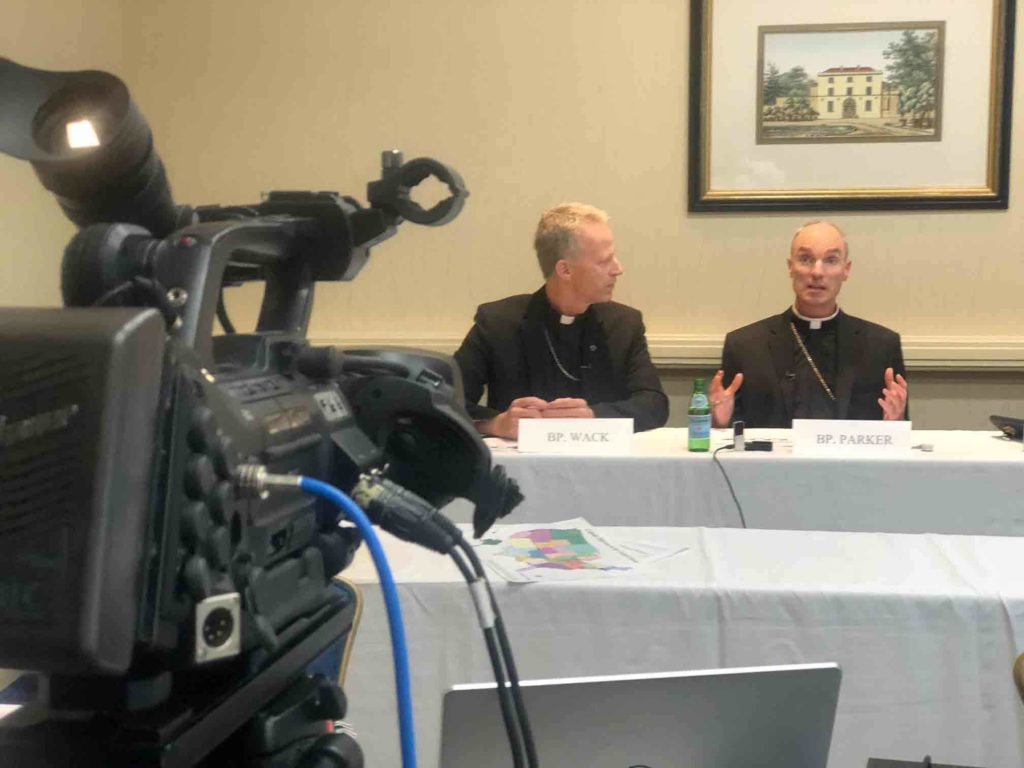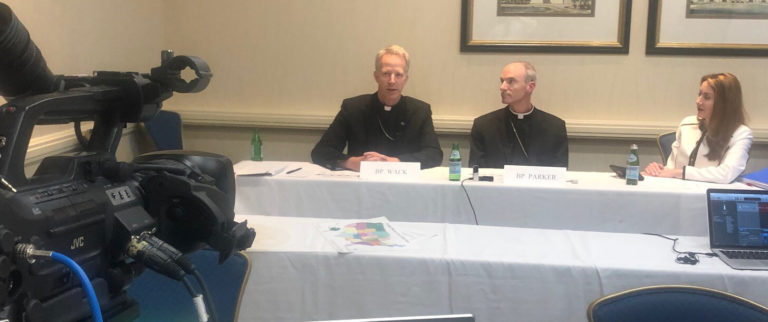
Transparency and honesty are key elements of restoring the trust of the laity, especially young people, according to two bishops who participated in a Facebook Live event sponsored June 11 by the U.S. Conference of Catholic Bishops during its spring general assembly.
Bishop Adam J. Parker, auxiliary bishop of Baltimore, and Bishop William A. Wack of Pensacola-Tallahassee, Fla., answered questions submitted during the live social media broadcast seen by more than 6,300 people. Both have been bishops for less than three years and are among the youngest of the 441 active and retired bishops in the U.S.
Bishop Wack, 51, said that for the most part the church had been dealing well with the clergy sexual abuse crisis since the passage of the Charter for the Protection of Children and Young People in 2001. “But we have to go back, we have to keep going, keep being transparent and open up more and more things. … We need to be honest, first of all, and say this is who are, it’s what has happened in the past, but going forward it won’t define us,” he said.
The church needs the laity to be part of the dialogue to help reform the church structures, he added.
Lay people can and should be involved at the local level, Bishop Parker, 47, said, noting that the Archdiocese of Baltimore has had a strong Independent Review Board since 1993. “When we’re specifically talking about the crime and sin of child sexual abuse, we have a board that is almost entirely made up of laypeople.”
The board assists the archdiocese in making the right decisions about the suitability for ministry of anyone accused of sexual misconduct with children. “But even in the day-to-day work in the life of parishes, lay people need to make their voices heard, not just in terms of accountability for what we’re doing to keep these structures in place, but they need to also be the eyes, the ears and the arms for evangelizing,” Bishop Parker said.
Asked by one viewer on Facebook how quickly parishioners would see implementation of measures expected to be approved at the meeting for the accountability of bishops, Bishop Wack said that although some elements require approval by the Vatican to ensure that they align with new law for the church established by Pope Francis in “Vos Estis Lux Mundi” (“You Are the Light of the World”) in May, the standards should take effect immediately.
Just as in 2002 after the Dallas Charter was passed, when dioceses immediately set up protocols for background checks, fingerprinting and safe environment classes, he hoped people would see right away the effects of the bishops’ votes.
Watch the entire FB Live session below. Story continues beneath video.
Responding to a question about the role of a victim assistance coordinator in dioceses, Bishop Wack pointed out that most of them are laypeople. People can call a priest at the chancery or the bishop’s office to report an allegation, “but frankly some people say, ‘no, that’s the problem; I don’t want to talk to another cleric, a clergy member.’ So, we have laypeople especially who are victim assistance coordinators and they can walk you through that.”
He noted that the victim assistance coordinator – often in the diocese’s office for child and youth protection or safe environment office – will ensure that if there is an alleged crime against someone who was under 18 at the time, they will recommend the person call local law enforcement immediately. With mandatory reporting requirements in almost all states, the victim assistance coordinator will also report the allegation to civil authorities.
Bishop Parker added that another thing that a victim assistance coordinator does is to represent the victim to the leadership of the archdiocese “to ensure that healing is occurring for the victim, that proper outreach has occurred. When the allegation is made, we also offer the opportunity for the alleged victim to meet with the archbishop or one of the auxiliary bishops.”
The topic of restoring trust in bishops came from a viewer, and both bishops emphasized that trust is based on relationships between bishops and the people they serve.
Bishop Parker said, “It can be easy to ascribe qualities to an entire group or entire body of people such as the entire body of bishops of the United States. But getting to know us individually as your diocesan bishop can help to build trust that goes both ways.”
Bishop Wack agreed, noting that he anecdotally gets calls or letters from people who say, “You’re good. We like you. It’s all those other guys” who cannot be trusted. “That underscores the value of a relationship, of building that up and trusting the people you work with.”
Bishop Parker added, “We understand why (the trust) is broken. We understand that it has been significantly impacted, especially over these past months as many revelations have occurred. And it hurts us, too, knowing that trust has eroded. We know that the onus is on us to build that back up.”
On a lighter note, the bishops were asked about their greatest joy as a bishop and how lay people can support them.
Bishop Wack noted that he has been a priest for 25 years, but a bishop for less than two. Being a bishop, “I like it, I’m getting there. But I love being a priest.
“Whenever I get to preach or preside or celebrate the sacraments or liturgies, I absolutely love it. But I suppose that the greatest joy is hearing individuals and families say, ‘We pray for you every night,’ or ‘Our little girl prays for you before she goes to bed.’”
Bishop Parker said that since his role as vicar general of the archdiocese is largely administrative, so his greatest joy is getting out of the chancery to engage with people in parishes, especially when he celebrates the sacrament of confirmation with young people.
“I love their enthusiasm. I love the fact that they have done a lot of preparation and service projects,” he said.
He agreed with Bishop Wack that prayers are very much appreciated. “To assist us, one other thing besides prayer is spreading the word among others about the mission of the church, about the ministry of the church, about the salvation that comes from Jesus Christ alone,” Bishop Parker said.
For ongoing coverage of the bishops’ meeting, click here.



